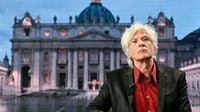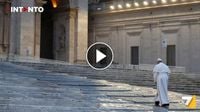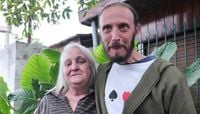In a poignant twist of fate, the disappearance of Emanuela Orlandi, a case that has captivated public attention for nearly 42 years, has resurfaced in the wake of Pope Francis's passing. Orlandi vanished on June 22, 1983, leaving behind a mystery that still haunts many. As of now, three investigations are underway, with the Vatican, the Rome Prosecutor's Office, and a Commission of Inquiry all working simultaneously to uncover what truly happened to the Vatican citizen. The recent death of Pope Francis on April 21, 2025, raises questions about the future of these investigations and whether they will finally yield the answers so many have sought.
Pope Francis, who died at the age of 88 after a long hospitalization at the Gemelli Polyclinic in Rome, had initiated the Vatican's investigation into Emanuela's disappearance shortly after the death of his predecessor, Pope Benedict XVI. Despite more than two years of inquiries, little progress has been made in the case, leaving Emanuela's family and supporters frustrated. "I hoped he wouldn’t follow the example of his predecessors who took the truth to their graves. He could have made history with his papacy if he had revealed the truth before he died," said Pietro Orlandi, Emanuela's brother, who has sought answers for decades.
Pietro Orlandi has been vocal about his desire to meet with Pope Francis since the latter's election in 2013. Unfortunately, his requests went unanswered, save for a brief encounter where the Pope remarked, "Emanuela is in heaven." This cryptic statement has left many wondering about the true nature of Emanuela's fate and what the Church may know.
As the Vatican and other authorities continue their investigations, the question remains: will the death of Pope Francis hinder or help the pursuit of truth regarding Emanuela Orlandi's disappearance? The simultaneous efforts of the Vatican, the Rome Prosecutor's Office, and the Commission of Inquiry mark a rare collaboration, raising hopes that the case may finally be resolved.
Meanwhile, Maria Elena Bergoglio, Pope Francis's sister, has been reflecting on her brother's legacy. Born on February 7, 1948, in Buenos Aires, she is the last surviving sibling of the Pope, who was known for his warmth and support. "He was always fun and supportive, as a big brother should be," she said, mourning the loss of a beloved family member.
With the passing of Pope Francis, many are left feeling a sense of loss, not just for the individual but for the potential impact he could have had on unresolved issues like Emanuela's case. President Mattarella expressed a sense of void, stating, "We feel the loss of a reference point."
As the world reflects on the legacy of Pope Francis, the Orlandi family continues to seek answers. The investigations into Emanuela's disappearance are set to continue, with hopes that the truth will finally emerge from the shadows of the Vatican's history.
In a broader context, the case of Emanuela Orlandi serves as a reminder of the unresolved issues that can linger for decades. The intertwining of personal tragedy and institutional secrecy raises questions about accountability and transparency within the Church. As the investigations proceed, the public remains vigilant, hoping for justice and closure.
In the coming weeks, as the Vatican adjusts to the loss of its leader, the focus will also turn to how the new papacy addresses ongoing investigations, including that of Emanuela Orlandi. Will they prioritize transparency, or will the legacy of silence continue? Only time will tell.
As the world mourns the loss of a Pope who made history in many ways, the Orlandi family clings to the hope that the truth will finally be revealed. The intertwining of these two stories—the legacy of Pope Francis and the mystery of Emanuela Orlandi—reminds us of the enduring human quest for truth and reconciliation.
The passing of Pope Francis marks not just the end of an era for the Catholic Church but also a pivotal moment for unresolved cases like Emanuela's. The ongoing investigations symbolize a broader struggle for truth within the Church, and as new leadership emerges, the hope for answers remains alive.
Ultimately, the case of Emanuela Orlandi is not just a story of a missing person; it is a reflection of the complexities of faith, family, and the pursuit of justice. As the investigations unfold, the world watches closely, hoping for a resolution that has eluded so many for far too long.






